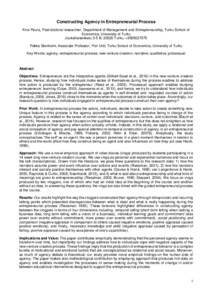Constructing agency in entrepreneurial process
Kirsi Peura; Pekka Stenholm
https://urn.fi/URN:NBN:fi-fe2021042822408
Tiivistelmä
Objectives: Entrepreneurs are the interpretive
agents (Gilbert-Saad et al., 2018) in the new venture creation process. Hence,
studying how individuals make sense of themselves during the process enables to
address how action is produced by the entrepreneur (Read et al., 2009). Processual
approach enables studying entrepreneurs’ learning (Cope, 2005; Jayawarna et
al., 2013), and hence, we try to understand how individuals in entrepreneurial
process construct themselves as agents in self-directed and -regulated courses
of action (Bandura, 2006; Jones, 2019) close to the moments when the outcomes
of action takes place. Accordingly, our research question is how individuals engaged in entrepreneurial
process construct their own agency?
Prior Work: In entrepreneurial
process the actors, individuals, decide to take action to create something new.
Unique feature in this process is the agency according to which individuals
perceive being in charge of the process. Agency is related to the sense of
control over individuals’ decisions, actions, and outcomes (Baum et al., 2014).
However, research has focused on the qualities of entrepreneurs, but this does
not enlighten us how individuals perceive their agency when action actually
unfolds. Instead, in this study, we apply a relational and social conception of
agency and pay special attention to temporal construction of agency in an
entrepreneurial process (Emirbayer & Mische, 1998; Flaherty, 2002; Hitlin &
Elder, 2007b). Analytically, the study conceptualizes “the self” as an agent;
the way a person perceives in a given moment themselves in relation to others
and the world affect how they construe being an agent and also influences on
how they act (see Harré, 1998).
Approach: We use a novel
empirical approach of video diaries (vlogs) produced by students participating
in a 14 week long new venture creation course. We use vlogs as personal and
experiential narratives and focus on the talk (transcriptions). Drawn from the
literature, we pose three questions to the research data: 1) how the narrators
assume power and exert influence over actions and events (Riessman, 2001); 2) how
the narrators interact and socially position themselves with other agents (Davies
& Harré, 1990; van Langenhove & Harré, 2005; Reynolds & Curtin,
2008; Eisenhardt, 2013); and 3) what is said about entrepreneurship and what
kind of meanings are given to entrepreneurship (Riessman, 2008; Bruner, 1990; Steyaert,
2004). We focus on vlogs produced by two vloggers, one of which who had an
initial idea at the beginning of the course and another without an idea. In
answering these questions, the vlogs are also timed with the guided
entrepreneurial process at the course.
Results: Our results highlight
the way the vloggers constructed their agency through idiosyncratic and recurring
talking points which presented discrepancies between what is ideal and what is
really happening during the entrepreneurial process (Riessman 1993). These
tensions highlighted differences in constructing agency between the vloggers in
terms of four dimensions including: temporal
telling (short term telling when lacking a business idea; long term telling
with a vision of a business), individual
learning goals and commitment (less power over events without commitment;
more power over events with commitment), social
positioning and comparison (negative appraisal in comparison to others
caused negative emotions, positive appraisal caused positive emotions), and
finally, necessary knowledge and skills
(negative appraisal caused by perception of failing; positive appraisal caused
by acceptance of one’s capabilities).
Implications and Value: The paper
contributes empirically demonstrating that the perceived agency seems to
transform over time, but importantly our findings address how to individuals
cope with negative aspects of the new venture creation process. These findings
imply that the production of entrepreneurial behavior is a complex bundle of
motivational and emotional factors that are conceptualized as relational and social
issues. Moreover, as much of agency debate is theoretical; our study provides
novel empirical findings on the human side of agency. The paper makes also
methodological contribution by employing approach that produces rich data on
agency and enables investigation the processes of sense making during the
moments of change in and/or between educational interventions designed to
support the entrepreneurial process.
Kokoelmat
- Rinnakkaistallenteet [29335]
